- Home
- Quizzes
- My Quiz Activity
- Newsletters
- Sports Betting
- MY FAVORITES
- Add Sports/Teams
- SPORTS
-
NFL
- NFL Home
- Arizona Cardinals
- Atlanta Falcons
- Baltimore Ravens
- Buffalo Bills
- Carolina Panthers
- Chicago Bears
- Cincinnati Bengals
- Cleveland Browns
- Dallas Cowboys
- Denver Broncos
- Detroit Lions
- Green Bay Packers
- Houston Texans
- Indianapolis Colts
- Jacksonville Jaguars
- Kansas City Chiefs
- Las Vegas Raiders
- Los Angeles Chargers
- Los Angeles Rams
- Miami Dolphins
- Minnesota Vikings
- New England Patriots
- New Orleans Saints
- New York Jets
- New York Giants
- Philadelphia Eagles
- Pittsburgh Steelers
- San Francisco 49ers
- Seattle Seahawks
- Tampa Bay Buccaneers
- Tennessee Titans
- Washington Commanders
-
MLB
- MLB Home
- Arizona Diamondbacks
- Atlanta Braves
- Baltimore Orioles
- Boston Red Sox
- Chicago White Sox
- Chicago Cubs
- Cincinnati Reds
- Cleveland Guardians
- Colorado Rockies
- Detroit Tigers
- Houston Astros
- Kansas City Royals
- Los Angeles Angels
- Los Angeles Dodgers
- Miami Marlins
- Milwaukee Brewers
- Minnesota Twins
- New York Yankees
- New York Mets
- Oakland Athletics
- Philadelphia Phillies
- Pittsburgh Pirates
- San Diego Padres
- San Francisco Giants
- Seattle Mariners
- St. Louis Cardinals
- Tampa Bay Rays
- Texas Rangers
- Toronto Blue Jays
- Washington Nationals
-
NBA
- NBA Home
- Atlanta Hawks
- Boston Celtics
- Brooklyn Nets
- Charlotte Hornets
- Chicago Bulls
- Cleveland Cavaliers
- Dallas Mavericks
- Denver Nuggets
- Detroit Pistons
- Golden State Warriors
- Houston Rockets
- Indiana Pacers
- Los Angeles Clippers
- Los Angeles Lakers
- Memphis Grizzlies
- Miami Heat
- Milwaukee Bucks
- Minnesota Timberwolves
- New Orleans Pelicans
- New York Knicks
- Oklahoma City Thunder
- Orlando Magic
- Philadelphia 76ers
- Phoenix Suns
- Portland Trail Blazers
- Sacramento Kings
- San Antonio Spurs
- Toronto Raptors
- Utah Jazz
- Washington Wizards
-
NHL
- NHL Home
- Anaheim Ducks
- Arizona Coyotes
- Boston Bruins
- Buffalo Sabres
- Calgary Flames
- Carolina Hurricanes
- Chicago Blackhawks
- Colorado Avalanche
- Columbus Blue Jackets
- Dallas Stars
- Detroit Red Wings
- Edmonton Oilers
- Florida Panthers
- Los Angeles Kings
- Minnesota Wild
- Montreal Canadiens
- Nashville Predators
- New Jersey Devils
- New York Islanders
- New York Rangers
- Ottawa Senators
- Philadelphia Flyers
- Pittsburgh Penguins
- San Jose Sharks
- Seattle Kraken
- St. Louis Blues
- Tampa Bay Lightning
- Toronto Maple Leafs
- Vancouver Canucks
- Vegas Golden Knights
- Washington Capitals
- Winnipeg Jets
- NCAAF
- NCAAM
- Boxing
- Entertainment
- Lifestyle
- Golf
- MMA
- Soccer
- Tennis
- Wrestling
- More Sports
- RESOURCES
- My Account
- YB on Facebook
- YB on Twitter
- YB on Flipboard
- Contact Us
- Privacy Policy
- Terms of Service
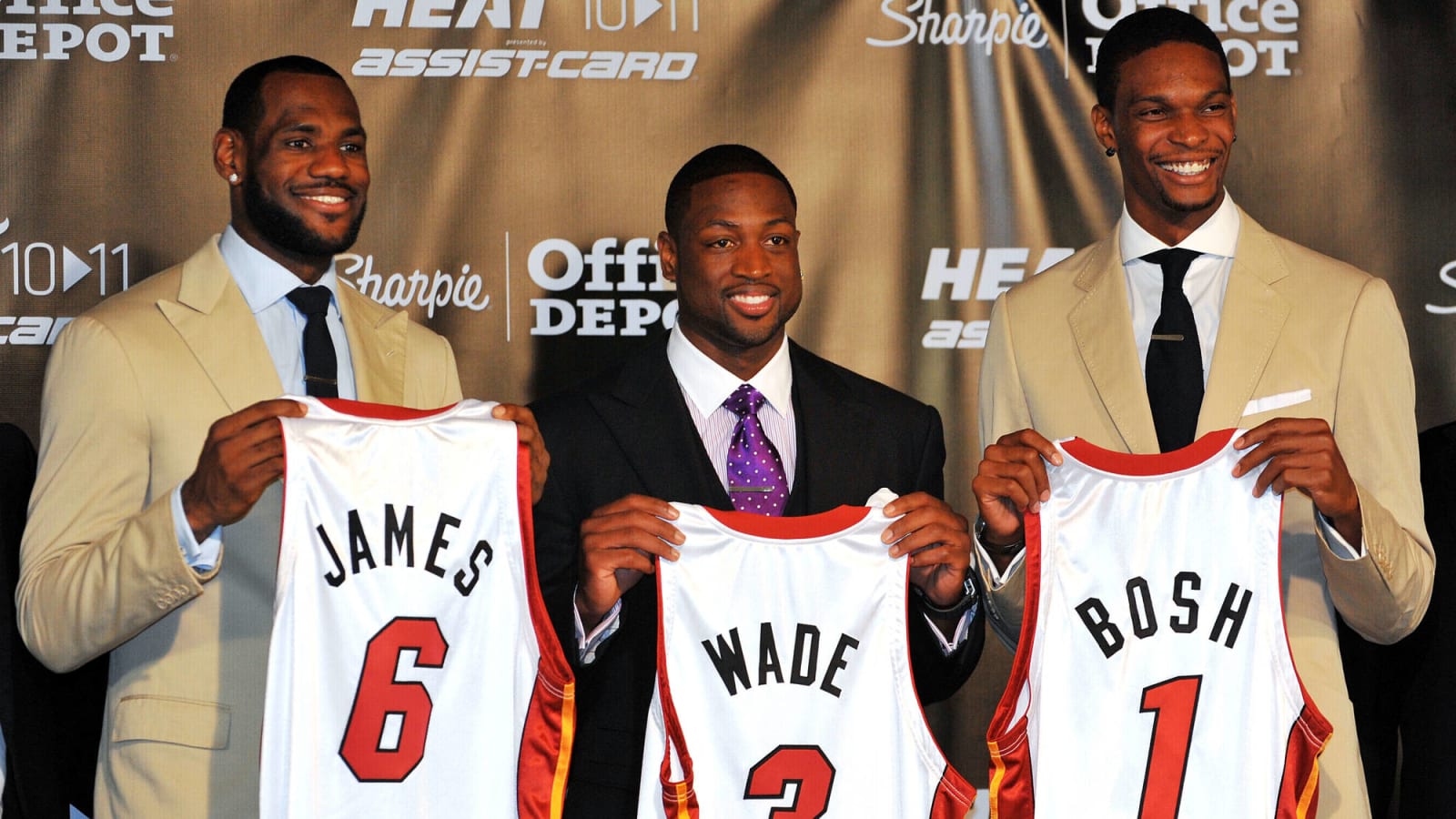
The greatest close-but-not-quite dynasties in sports
Achieving dynasty status is hard for a reason. If the standards weren't so strict, there would be plenty of teams throughout history that would qualify for the designation.
There are teams that either didn't win enough championships, had too much of a gap between wins, or simply had even better teams standing in their way. There are even some teams on this list that still have a chance to become dynasties but aren't quite there yet.
Let's take a look at some of the greatest teams across sports that fell just short of dynasty status.
Cincinnati Reds, 1970-1976

The Big Red Machine won two World Series titles in the mid-1970s, lost an NLCS in a decisive Game 5 before that, dropped a World Series in a decisive Game 7 the year before that and lost another World Series way back in 1970. So, in a seven-season span, Cincy was in the World Series four times, won it twice and was one win away from a fifth appearance. That's pretty dominant work overall, but it still isn't good enough to be considered a dynasty, despite the fact that those Reds are remembered as one of the most fearsome teams in baseball's modern era. Sorry, Joe Morgan.
Miami Dolphins, 1971-1974
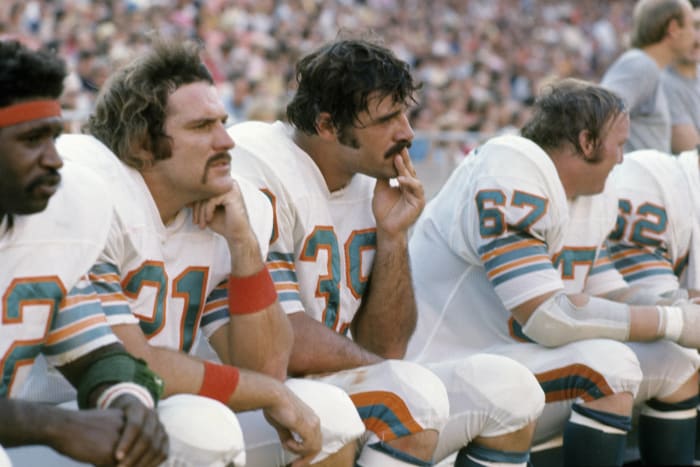
Undefeated season? Check. Back-to-back Super Bowl titles? Check. Three in five years? Ah, so close but so far. The Dolphins got to the Big Game in 1971 but fell to Dallas in lopsided fashion. They responded by going 17-0 the following year, then followed that up with a thrashing of the Vikings (more on them later) in 1973. Unfortunately, as good as Larry Csonka, Bob Griese, Paul Warfield and rest of the Dolphins were, they couldn't bookend the '72 and '73 title years with one more, thus relegating them to "merely excellent" as opposed to "dynastic."
Minnesota Vikings, 1973-1976

For all the flack the Buffalo Bills get for losing four consecutive Super Bowls, you'd think people, especially the older crowd, would remind younger sports fans that the Vikings nearly matched the "feat" in the mid-1970s. Minnesota, under the leadership of Bud Grant and backed by a fearsome defensive line, the "Purple People Eaters," was a perennial contender, winning the NFC in 1973, 1974 and 1976, yet the Vikes lost in the Super Bowl each time. None of those games, by the way, was decided by fewer than 10 points. When you think of teams that could truly have been dynasties only to be denied on the precipice repeatedly, the Vikings are a fine choice.
Dallas Cowboys, 1975-1978
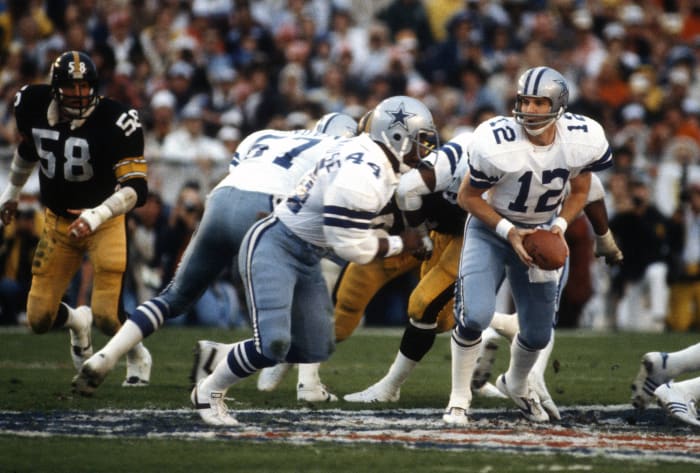
Dallas played in the Super Bowl in 1975, 1977 and 1978, winning it in 1977. The Cowboys' particular roadblock to dynastic glory and the accompanying immortality resided in the Pittsburgh Steelers, who twice tortured them in classic Super Bowl clashes. Dallas did just enough to lose the games, while the Steelers made all the big plays when they needed them most. The two franchises are, to this day, arguably the two most popular in the league, and the contrast in personality and ownership styles made them the perfect foils for one another back then. Unfortunately for Dallas, to the victor go the spoils, and so the Steelers are the team of the '70s, while Dallas has to settle for being one of several very good squads.
Denver Broncos, 1986-1989
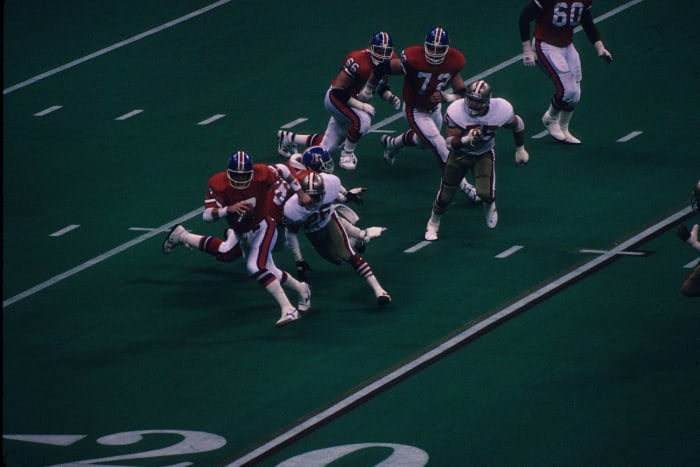
If the Vikings were the originators of the "get to the Super Bowl frequently and lose every time" tactic and the Bills perfected it, then the Broncos were the team that bridged the two. Denver made it to the Big Game three times in four years in the late-'80s and lost the three games by an average of 32 points. The 55-10 drubbing at the hands of the 49ers in the 1989-90 season remains the most lopsided Super Bowl of all time. I guess you'd really say that while the Broncos were technically close to being a dynasty, they were about as far away as you can be while still coming up just one win short on three separate tries.
Toronto Blue Jays, 1989-1993

Don't laugh. The Jays won two World Series titles, but they were in the ALCS the prior year, falling to the eventual champion Twins in five games, and made it in 1989 as well, when they were overwhelmed by the Oakland Athletics, who also went on to win the Fall Classic. Cito Gaston's squad was loaded with talent and paid it off nicely. Had they found a way to get one more championship out of their five-year window, the Blue Jays would rightfully be looked at as a dynasty.
Detroit Pistons, 1987-1991

The Pistons are awfully close to being on the dynasty list. They ran into the Lakers at the wrong time, barely lost in the NBA Finals, then won two championships in a row, bullying Michael Jordan along the way. Then, Jordan figured them out. That was it for Detroit as a serious player in the Eastern Conference. The late-'80s were good to the Bad Boys, but they fell one win short — against Los Angeles in 1988 — of becoming a dynasty. If I were picking the actual best team to not have won at least three titles in a five-year span, the Pistons might be it.
Pittsburgh Pirates, 1990-1992

This one hurts on a personal level, as tiny, roughly first-grade-aged Chris had to sit and watch the Pirates get their hearts ripped out in the NLCS three straight years, first by the eventual world champion Reds, then twice, the second in legendarily awful fashion, by the Atlanta Braves. Would the Pirates have found a way to win all three of those World Series had they got there, thus meeting the dynasty threshold? Who knows for sure, but you'll never convince me that they wouldn't have.
Buffalo Bills, 1990-1993
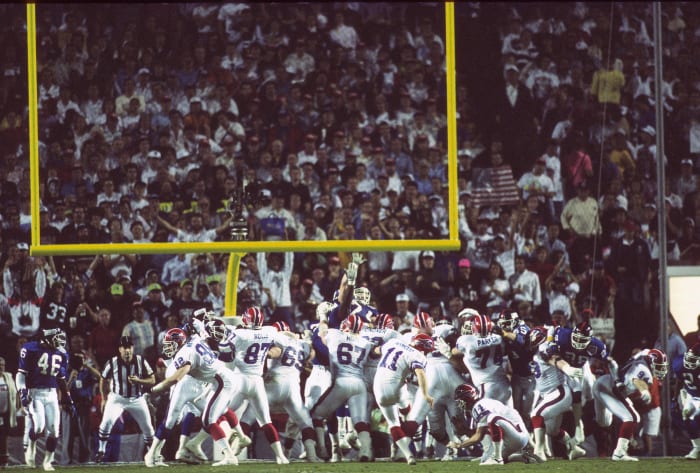
The early-'90s Bills are the (fool's) gold standard by which all other "near-miss" dynasties must be judged. Marv Levy was good enough to get Buffalo to four straight Super Bowls, only to lose all four, getting routed in three of them and having kicker Scott Norwood gut all of western New York in the first one. The Bills were a fearsome presence in the AFC, wreaking havoc in the conference. However, something just happened to them with the biggest prize at stake, and they never got over that hump. Saying any more about them is almost unnecessary, since virtually anyone over a certain age knows Buffalo's failures back and front. When your team's name gets turned into an acronym for "Boy I Love Losing Super Bowls," you know it's bad.
Pittsburgh Penguins, 1990-1993

The early-'90s Penguins were one of the last great collections of pure offensive talent in the NHL. Though neither one of the Stanley Cup-winning teams tore through the regular season, when both got humming in the playoffs, they were a thing of beauty to watch. The 1992-93 Penguins were regarded by those who played on all three teams as the best of the bunch and perhaps the best team in franchise history. Oh, and they ended the season on a 17-game winning streak. Problem was, they didn't win the Stanley Cup, instead getting shocked by David Volek and the New York Islanders in the second round of the playoffs. Not only did the Penguins fall short of a third title, but hockey fans were deprived of a Wayne Gretzky-Mario Lemieux showdown in the Stanley Cup Final.
Atlanta Braves, 1991-2005

Are these Braves a dynasty? Probably. Do I still hold a grudge against them for beating my beloved Tribe for a World Series in 1995? Absolutely. Am I then, in spectacularly petty fashion, going to place them on the "not quite a dynasty" list because they only won that one World Series despite winning the NL East an astonishing 14 years in a row? You betcha. Seriously though, if you'd like to say that a dynasty is a team that is dominant year in and year out, and should not be judged by the small sample size whims of the playoffs, especially in a sport like baseball, I can't argue with you.
Houston Rockets, 1993-1995
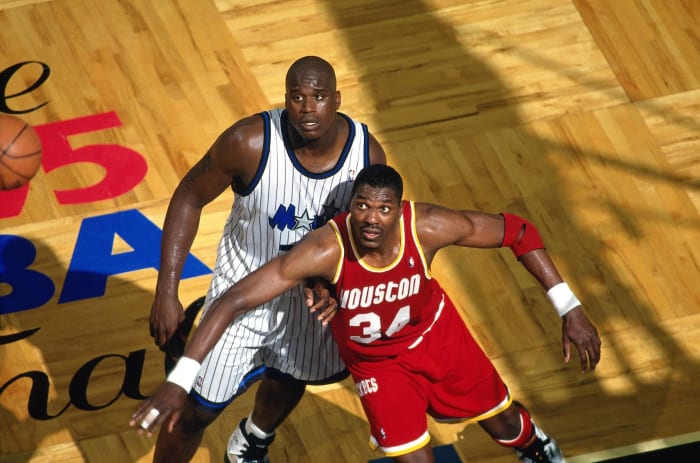
You'll never see a team get less respect than the Rockets of the mid-'90s, aka "the team that won two titles while Michael Jordan wasn't around." Sure, Jordan had come back by the time Houston's title defense was ramping up, but no one seems to count that against him. Still, the Rockets survived a classic NBA Finals against the Knicks, then routed the callow Orlando Magic the following season. The one series most '90s NBA fans wish they could have seen was Hakeem Olajuwon and the Rockets vs. MJ and the Bulls. Alas, Rockets fans will have to settle for two titles, near-dynasty status and constant whispers about whether they could have beaten prime Jordan.
Detroit Red Wings, 1994-1998

The Red Wings of the mid- to late-'90s were awe-inspiring. They lost in the Stanley Cup Final in 1995 to the trap-happy Devils, fell in the conference final to the Colorado Avalanche the following season, then won two Cups in a row. What makes them tantalizingly close to a dynasty is the fact that the team that lost to Colorado set an NHL record with 62 regular-season wins. Had Steve Yzerman, Sergei Fedorov and company finished out that year with a title, then continued on and still won the following two seasons, they would stand as the only team since the early-'80s Islanders to win three straight Cups.
Cleveland Indians, 1995-2001

Heartbreak and Cleveland sports — they go together like chocolate and peanut butter. The Indians were the flag-bearers for this dynamic from the mid-'90s until just after the turn of the century. The Tribe lost the World Series twice, in 1995 to Atlanta and 1997 in truly excruciating fashion to the Marlins. The 1998 Indians were the only team to beat the Yankees at all in the playoffs, losing in six games in the ALCS, and the 1999 and 2001 squads both lost decisive Game 5s in the ALDS. Cleveland sports fans would have to wait 15 more years for a championship to finally come to town.
Sacramento Kings, 2000-2004

The Kings, during an era that produced some pretty bad basketball, were a breath of fresh air. They were the Warriors minus the truly insane shooting ability. They played beautiful, team-oriented basketball, made audacious passes and were robbed of their rightful trip to the NBA Finals by one of the most suspiciously officiated games in league history: Game 6 of the 2002 Western Conference Finals. Who knows what would have happened had they knocked off the Lakers that year? Probably a title, perhaps more to follow. Alas, we'll never know.
Chicago Blackhawks, 2009-2015

This is where having a strict rubric for dynastic qualifications makes things tough. The Blackhawks were without question the NHL's best franchise from 2009-10 through 2014-15. They won three Stanley Cups in six seasons and for a time supplanted the Penguins as the league's marquee franchise. While they fell on very tough times this year, for several seasons they were the gold standard, and they might have won even more had they not had to deal with a worthy adversary in their own conference in the form of the Los Angeles Kings, not to mention the rest of the rugged West.
Los Angeles Lakers, 2007-2011

Kobe Bryant got himself two titles without Shaq around, and you know for Kobe those are his most treasured championships. Never mind the fact that he had Pau Gasol, an elite talent in his own right, around to help. Kobe got these two trophies as the undisputed centerpiece of the Lakers and was able to re-ignite a modern-day version of the league's most heated traditional rivalry with Boston. The Lakers fell short of dynasty status, unlike the turn of the century version, because they couldn't find a way to get one more championship. I guess Kobe will have to admit that his best years were with Shaq (please don't beat me up if you read this, Kobe).
Philadelphia Phillies, 2007-2011
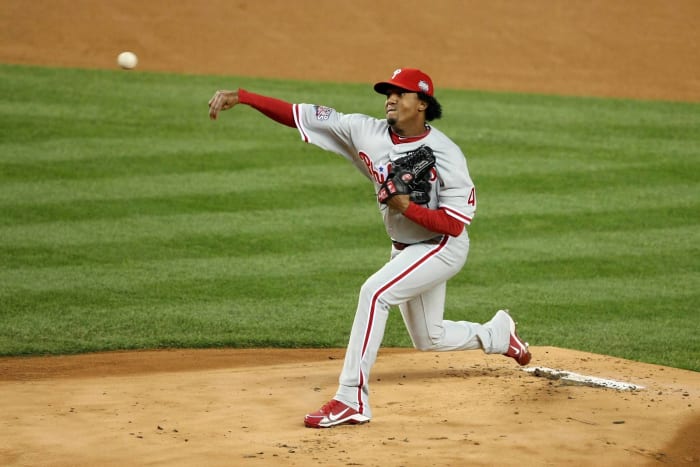
Count the Phillies in the group of teams that ended up having success but couldn't bring home multiple titles. They won the World Series in 2008, lost it the following year to the Yankees, then ran into the eventual champion Giants in the NLCS the following season. They were still highly competitive the following year when they pushed the St. Louis Cardinals to a decisive fifth game in the NLDS before bowing out. Oh, and the Cardinals went on to win the World Series that year. So, if you're scoring at home, the Phillies won it all in 2008 and were subsequently eliminated by the eventual champion each of the next three seasons. Sounds like an almost-dynasty to me.
Miami Heat, 2010-2014
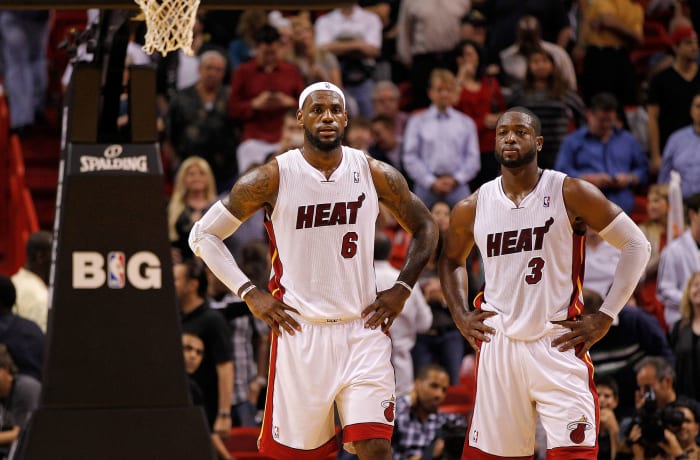
LeBron James took his talents to South Beach and, in year one, fell flat on his face. Yes, he reached the NBA Finals, but given that everyone — James included — seemed to be treating a Miami title as a fait accompli, the fact that the Heat fell short against the Mavericks was a massive failure. Two wins over the next two years, including an all-time thriller against the Spurs, got things back on track again, but San Antonio exacted revenge in 2014, thus preventing the Heat from truly reaching dynasty status. But hey, at least LeBron's trip to Miami gave rise to the era of the super team, so uh, good on Miami, I guess?
Los Angeles Kings, 2011-2014

The tough, physical, defensively stout Kings were part of an era that saw the Stanley Cup change hands from Los Angeles to Chicago seemingly year to year. They lost to Chicago in the 2013 Western Conference Final and, had they not done so, figured to have been a good bet to vanquish Boston and claim what would have at the time been a second straight Stanley Cup. Had they done that, it's no guarantee they would have had enough in the tank to win the following season like they did, but the 2013-14 squad did survive three consecutive seven-game series to cruise past the New York Rangers in the Final.
Cleveland Cavaliers, 2014-2018

After enjoying the Miami sun for a few years, LeBron came back home and delivered what Clevelanders had been pining for for decades: a championship. He did it in thrilling fashion, too, willing (with a big assist from Kyrie Irving) the Cavs to a championship against an all-time great Golden State Warriors squad. LeBron may have been able to carve out a dynasty in Cleveland, and may still be on the Cavs today, but for those pesky Warriors, who won three out of the four NBA Finals meetings between the two teams. If conference champions could be dynasties, then the Cavs would have been set.
Pittsburgh Penguins, 2015-present
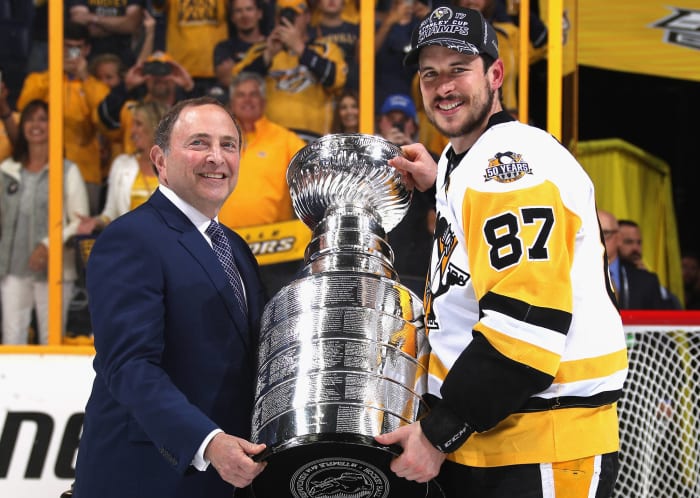
After becoming the first team to win back-to-back Cups since the Red Wings 20 years prior, the Penguins were thwarted in their quest to three-peat by the eventual champion Washington Capitals in the 2017-18 season. Since then, Sidney Crosby and company have naturally fallen off into just a regular playoff-caliber team, and with Crosby, Evgeni Malkin and Kris Letang not getting any younger, it looks like their championship window is shut.
The "LeBron non-dynasty," 2010-present

Noticing a theme yet? Since 2010, wherever LeBron goes, NBA Finals appearances follow. He made the Finals eight straight seasons with two different teams, winning the title three times. Is that a dynasty? Probably, yes, but again, we have a strict grading scale here, so instead of being a dynasty unto himself, LeBron carries the unique distinction of literally shifting the balance of power whenever he goes to a new team. He continued that by winning a title in his second season with the Lakers, but Los Angeles got blown out by the Suns in last year's playoffs, so while his personal run is impressive, it's not dynastic.
Clemson Football, 2015-present
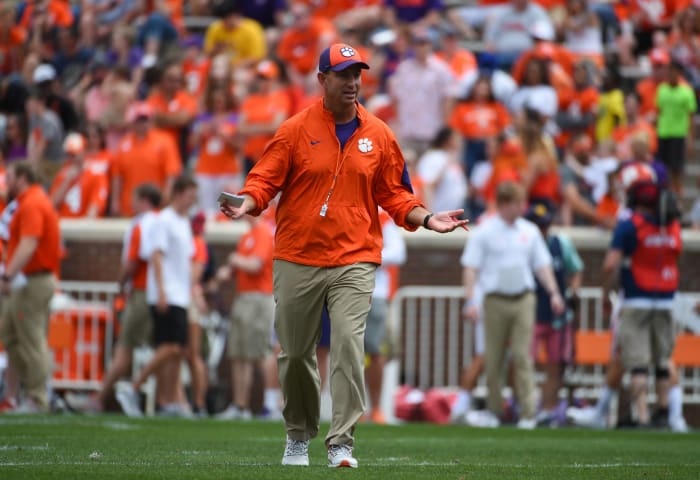
Blame it on Saban. Dabo Swinney has done an admirable job of building the Tigers into one of the best programs in college football, and while Clemson is 2-2 against the Crimson Tide in College Football Playoff games, their inability to completely take over the sport the way Saban did makes them just shy of a dynasty. This particular book is not done being written, but Clemson has struggled badly this season. If Swinney can right the ship, the Tigers should remain a perennial contender, but he needs to settle his quarterback situation first.
Chris Mueller is the co-host of The PM Team with Poni & Mueller on Pittsburgh's 93.7 The Fan, Monday-Friday from 2-6 p.m. ET. Owner of a dog with a Napoleon complex, consumer of beer, cooker of chili, closet Cleveland Browns fan. On Twitter at @ChrisMuellerPGH – please laugh.
More must-reads:
- Winners and losers from Day 2 of the 2024 NFL Draft
- Juwan Howard returning to NBA as Eastern Conference assistant
- The '100 catches in an NFL season' quiz
Breaking News
Customize Your Newsletter
 +
+
Get the latest news and rumors, customized to your favorite sports and teams. Emailed daily. Always free!
Use of this website (including any and all parts and
components) constitutes your acceptance of these
Terms of Service and Privacy Policy.

